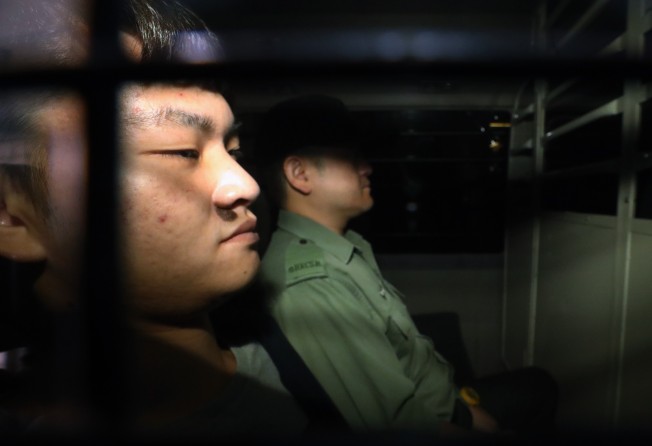Hong Kong murder suspect whose case sparked extradition bill protests to be released from prison next month
- Chan Tong-kai is wanted in Taiwan in connection with death of pregnant girlfriend Poon Hiu-wing
- Chan has been in prison for money laundering but will be free to leave the city once he is released on October 23

The Hongkonger at the centre of the firestorm over the now-abandoned extradition bill, who is wanted in connection with a murder in Taiwan, is expected to be released from prison on October 23, the Post has learned.
Chan Tong-kai is a suspect in the death of his pregnant girlfriend, but cannot be transferred to the self-ruled island because the two places lack an extradition agreement.
Presently in jail in Hong Kong after being found guilty of money-laundering, Chan was expected to be released from the Pik Uk Correctional Institution next month, a source said.
Lawmaker Ann Chiang Lai-wan, of the Democratic Alliance for the Betterment and Progress of Hong Kong, visited Chan in July and tried to persuade him to surrender to Taiwan authorities.
Chiang told the Post she had no contact with Chan since the visit.
“I said I would like to visit him again after the meeting last time. But we ended up having no further contact,” she said. “But I know a priest has been working [on the case].”
She refused to say whether Chan rejected her visits and how she viewed the chances of Chan turning himself over to the Taiwan authorities after being released.
Executive councillor Ronny Tong Ka-wah, also a Senior Counsel, said there were no further ways to pursue the case.
“As a permanent resident, Chan enjoys freedom in leaving and entering Hong Kong according to the Basic Law. There is no way to limit his freedom after he is released,” Tong said. “It is unacceptable for me, but society has reached the point of no return.”
Meanwhile, opposition lawmakers have unsuccessfully tried to draft their own bills to resolve the matter.
Andrew Wan Siu-kin, of the Democracy Party, drafted an amendment to the Criminal Jurisdiction Bill which involved giving local courts extraterritorial powers over crimes such as murder and genocide.
After the Department of Justice approved the bill as conforming to the legal requirements, Wan wrote to the president of the Legislative Council, Andrew Leung Kwan-yuen, hoping Legco could expedite the process by directly sending the amendment to the full council meeting for discussion.
However, Leung replied in August and said he needed to follow standard procedure, and would rule if Wan’s bill conformed to the rule book after a panel discussion.
“It shows the pro-establishment camp and the government are so hypocritical. The timing for sure will lapse if we have to start from a panel,” Wan said. “They smothered the last chance to serve justice with procedures.”
Secretary for Justice Teresa Cheng Yeuk-wah has rejected the proposal to empower local courts since in May. She said the measure would change the tradition that local courts dealt only with crimes committed in Hong Kong.
Labour Party legislator Fernando Cheung Chiu-hung withdrew his bill in July, which would have allowed the city to transfer criminal suspects to Taiwan, but not mainland China or Macau, hours after his proposal sparked fierce debate among protesters.
“The public attention has already left the case. But I still believe it deserves our attention for such injustice,” Cheung said.
Calling it a “sensitive topic”, he said justice could only be served if the Hong Kong and Taiwan governments could come to some arrangement.
The death of Poon Hiu-wing, who died while on holiday in Taiwan with Chan, prompted Chief Executive Carrie Lam Cheng Yuet-ngor to push through her extradition bill, which would have allowed Hong Kong to send fugitives to jurisdictions with which it had no extradition agreement, including mainland China.
The bill has sparked 17 straight weekends of protests, which have morphed into a wider anti-government movement, with calls for an inquiry over police use of force, and the implementation of universal suffrage.